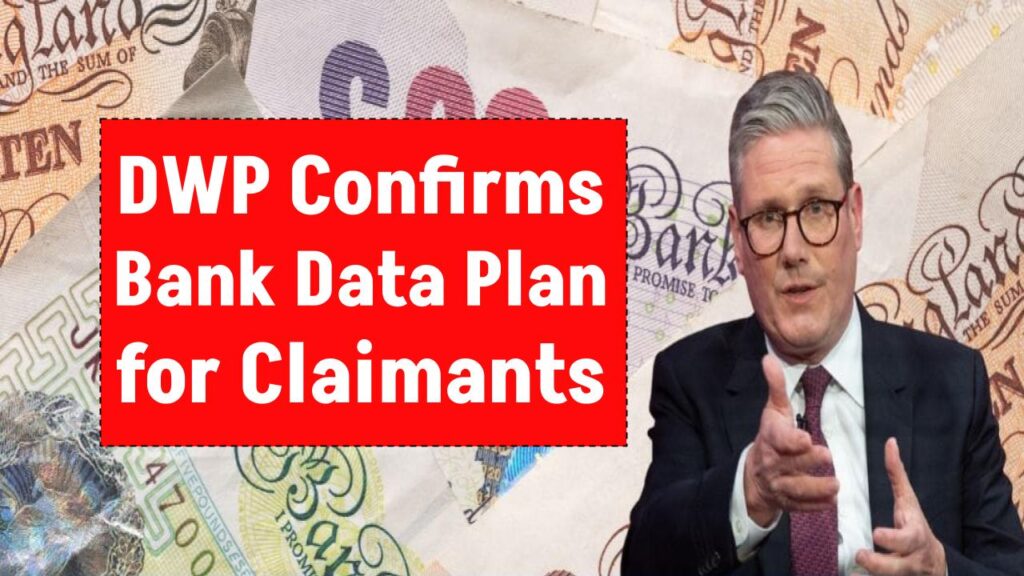DWP Confirms Bank Surveillance Rollout to Tackle Fraud—Will Your Finances Be Flagged?
DWP Confirms Bank Surveillance Rollout: The UK Department for Work and Pensions (DWP) has announced a bold new strategy to fight benefit fraud—bank account monitoring. This plan, which forms part of the proposed Public Authorities (Fraud, Error, and Recovery) Bill, is being called the biggest fraud crackdown in a generation, and it’s set to begin in 2026.

Let’s break down what this means for everyday people, especially those receiving means-tested benefits like Universal Credit, Pension Credit, or ESA.
DWP Confirms Bank Surveillance Rollout
| Feature | Details |
|---|---|
| Policy Name | Public Authorities (Fraud, Error, and Recovery) Bill |
| Implementation Year | 2026 |
| What Will Be Monitored | Bank account data such as savings and transaction patterns |
| Target Group | Claimants of means-tested benefits |
| Savings Threshold | £16,000+ triggers eligibility review |
| Pilot Findings | Over 63,000 cases flagged in tests with two major banks |
| Privacy Concern | No full access to bank accounts; only relevant data to be shared |
| Official Website | gov.uk |
The DWP’s new bank surveillance plan could transform how fraud is detected across the UK welfare system. While the intent—to reduce fraud—is widely supported, the execution raises concerns around privacy, fairness, and transparency. As a claimant, it’s more important than ever to stay informed, declare your finances honestly, and understand how these changes might affect your benefits.
The key takeaway? If you’re playing by the rules, you likely have nothing to worry about—but it’s still worth double-checking your financial records to stay on the safe side.
Why Is the DWP Introducing Bank Account Monitoring?
Benefit fraud costs the government billions of pounds each year. In 2022-23 alone, over £8 billion was estimated to be lost to fraud and error across the welfare system. To tackle this issue, the DWP has proposed legal changes that will allow banks to share limited financial data with them. The aim is simple: identify claimants who are breaking the rules, especially those hiding large savings or undeclared income.
Currently, benefit fraud investigations rely heavily on tip-offs or random checks. With this new system, technology and data-sharing will make it easier to spot fraud early.
What Kind of Information Will Be Monitored?
The DWP has clarified that this is not a free-for-all. Officials will not be able to see full bank statements or transaction histories. Instead, banks will flag accounts where:
- Savings exceed £16,000 (the upper limit for Universal Credit and other benefits)
- Unusual or undeclared income is detected
- Multiple high-value transfers raise suspicion
Importantly, the focus is on flagging potential issues, not penalizing people automatically.
What Did the Pilot Program Reveal?
A pilot program involving two major banks found 63,000+ potential violations among benefit claimants. These included:
- Claimants exceeding the asset threshold
- Suspicious financial activity inconsistent with declared income
- Duplicate claims under different identities
The success of this trial has prompted the DWP to consider a wider rollout with more banks involved from 2026.
Could This Expand to Open Banking?
Yes. The government is exploring the use of open banking models. This would allow real-time financial data access, similar to how landlords and lenders check eligibility.
If adopted, the DWP could gain automated insights into financial activity—though this raises serious privacy concerns.
Are My Privacy Rights at Risk?
That’s a valid concern—and one that’s already being raised by privacy advocates.
According to the DWP:
In other words:
- DWP will receive only pre-defined data
- Banks must follow strict privacy safeguards
- No manual reading of personal transactions will take place
Additionally, banks could be penalized for over-sharing or mishandling private data.
Still, civil rights groups warn that this could set a precedent for government surveillance and erode public trust.
Who Will Be Affected by the Bank Monitoring System?
You may be flagged for a DWP review if:
- You receive means-tested benefits such as:
- Universal Credit
- Pension Credit
- Housing Benefit
- Employment and Support Allowance (ESA)
- Your bank account has over £6,000 in savings, which may reduce your benefit amount
- You exceed £16,000 in savings, which could make you completely ineligible
- You make large, unexplained deposits or receive money from overseas
In short, if your financial situation doesn’t match what you’ve declared, you may come under scrutiny.
DWP Confirms Bank Surveillance Rollout: How Can Claimants Protect Themselves?
The best way to stay safe is to be honest, transparent, and up to date with your benefit declarations.
Here’s what you should do:
Keep Your Savings in Check
- If your total savings cross the £6,000 or £16,000 thresholds, update your claim immediately.
Declare All Income
- Even part-time jobs, side gigs, or money from family should be reported to avoid penalties.
Watch for Overpayments
- If you’re overpaid due to undeclared funds, you may need to repay the entire amount and possibly face legal action.
Check Your Bank Records
- Ensure your income and savings match your benefit application. If not, rectify it through your UC journal or local Jobcentre.
Is There Any Opposition to the Plan?
Yes, Labour Party leaders, civil society organizations, and privacy campaigners have all raised concerns. Their main arguments include:
- The potential for unwarranted surveillance
- Risk of false positives unfairly affecting vulnerable people
- Lack of transparency in how data will be interpreted
- Fears of an automated system wrongly flagging claimants
They are urging the government to publish full technical details, ensure independent oversight, and introduce appeal mechanisms for those wrongly targeted.
FAQs on DWP Confirms Bank Surveillance Rollout
Q1: Will the DWP see everything in my account?
No. Only summary data like account balances or unusual activity will be shared—not full statements or personal transactions.
Q2: Will all benefit claimants be monitored?
Initially, this will affect means-tested benefits. Over time, it may expand, depending on the system’s success.
Q3: What if I’m wrongly flagged?
The DWP must notify you before taking action. You’ll be given a chance to explain or appeal the findings.
Q4: When will the system start?
It is expected to roll out in 2026, following parliamentary approval of the Fraud Bill.
Q5: Which banks are involved?
The names of banks in the pilot haven’t been officially disclosed, but the DWP plans to collaborate with major UK banks as the rollout expands.








